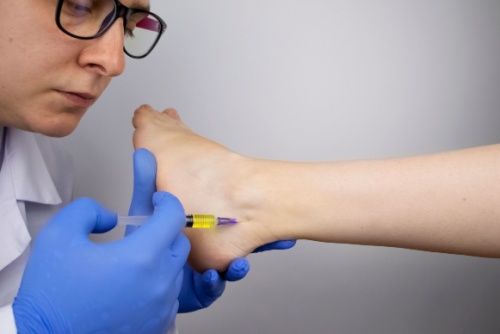Living with chronic pain can disrupt your daily life and overall well-being. At Georgia Spine & Orthopaedics, we recognize the challenges you face and are committed to offering comprehensive pain management solutions. One effective method we employ is medical injections. These targeted injections deliver medication directly to the site of your pain, providing localized relief and improved function.
Schedule a consultation today! Our board-certified pain management specialists can evaluate your individual needs and determine if medical injections are suitable for helping you regain a pain-free life. Contact us at 678-929-4494 to begin.
How Are Medical Injections Used in Pain Management?
Medical injections are fundamental to pain management, providing a minimally invasive means to administer medication precisely where it’s needed. This targeted approach offers several advantages over traditional oral medications, making it a valuable tool for managing various pain conditions.
1. Quicker Pain Relief
Unlike oral medications that must pass through the digestive system and bloodstream before reaching the affected area, injections deliver medication directly to the pain source. This significantly reduces the onset time for pain relief. With injections, you may experience relief within minutes or hours, compared to waiting for oral medications to take effect over a longer period.
2. Lower Risk of Systemic Side Effects
Oral medications spread throughout the body, affecting not just the targeted area but also other organs and systems. This can lead to a broader range of potential side effects. Injections, however, deliver medication precisely to the specific pain site, minimizing the risk of systemic side effects. This is particularly advantageous for individuals with pre-existing medical conditions or sensitivities to certain medications.
3. Enhanced Precision and Effectiveness
While oral medications have a general effect throughout the body, injections offer a more precise approach. By targeting medication directly to the pain source, injections ensure a higher concentration of the medication reaches the intended area. This improved accuracy maximizes the effectiveness of the medication in providing relief.
4. Long-Lasting Pain Management
While some injections offer immediate relief, others use medications with sustained-release properties. These injections provide long-acting pain control, offering relief that can last for days, weeks, or even months, depending on the injection type and medication used.
5. Diagnostic Capabilities
Certain injections not only provide pain relief but also serve as a diagnostic tool. For instance, a facet joint injection can help identify the specific facet joint causing back pain. The effectiveness of pain relief after the injection can confirm the diagnosis and guide further treatment decisions.
What Are Some of the Types of Injuries or Conditions that Can Be Treated With Medical Injections?
Arthritis Pain Management
Osteoarthritis and rheumatoid arthritis are common forms of arthritis that can cause significant joint pain, stiffness, and inflammation. Medical injections offer a comprehensive approach to managing arthritis pain. Corticosteroid injections, administered directly into the inflamed joint, can provide quick and effective relief by reducing inflammation. Hyaluronic acid injections can also be beneficial, acting as a lubricant and shock absorber within the joint, enhancing mobility and reducing pain. Platelet-rich plasma (PRP) injections, a newer treatment option, use a concentration of a patient’s own platelets to promote healing and regeneration in arthritic joints, offering potential long-term relief.
Back Pain Relief
Low back pain is a prevalent issue, and medical injections can target specific pain sources. Facet joint injections deliver medication directly to the facet joints, a common source of low back pain. Epidural steroid injections, where medication is injected into the epidural space around the spinal cord, can alleviate inflammation affecting nerve roots and reduce pain radiating down the leg (sciatica). Sacroiliac joint injections target the sacroiliac joint at the base of the spine, another potential source of low back pain.
Addressing Neck Pain
Neck pain can stem from various factors, and medical injections offer targeted solutions. Cervical medial branch block injections temporarily numb specific nerves supplying the facet joints in the neck, helping diagnose the pain source and providing temporary relief. Cervical epidural steroid injections deliver medication to the epidural space in the cervical spine, reducing inflammation and pain in the cervical nerve roots, offering relief for neck pain, headaches, and radiculopathy (pain radiating down the arm).
Joint Pain Management
Pain and inflammation in various joints, such as the knee, shoulder, and hip, can significantly impair mobility and function. Medical injections provide effective pain management strategies for these joints. Corticosteroid injections, akin to those used for arthritis, can offer swift relief by reducing inflammation. Joint PRP injections promote healing and regeneration within the joint, potentially offering long-term relief for pain. Additionally, hyaluronic acid injections may be beneficial for certain joint conditions.
Sports Injury Recovery
Acute pain resulting from sports injuries like tendonitis, bursitis, and ligament sprains can be effectively managed with medical injections. Corticosteroid injections can diminish inflammation and pain, facilitating faster healing and recovery. In some cases, PRP injections may be utilized to expedite tissue healing and recovery following sports injuries.
What Are the Different Types of Injections That Are Available at Georgia Spine & Orthopaedics?
At Georgia Spine & Orthopaedics, our pain management specialists offer a comprehensive range of medical injections to target your specific pain source. Here’s a breakdown of some common types:
Spinal Injections:
Radiofrequency Ablation (RFA)
This minimally invasive procedure employs radio waves to heat and disable pain-carrying nerves. RFA is frequently used for chronic spinal conditions like facet joint syndrome, providing long-term relief. By targeting specific nerves, RFA reduces pain signals reaching the brain, offering significant relief without harming surrounding tissues.
Cervical Medial Branch Block Injections
These injections target specific nerves supplying the facet joints in the cervical spine (neck). A local anesthetic is injected near these nerves, temporarily numbing them. This approach aids in diagnosing neck pain and headaches by determining if the facet joints contribute to the pain. Cervical medial branch block injections can also offer temporary pain relief.
Cervical Epidural Injections
Corticosteroid medication is injected into the epidural space around the spinal cord in the cervical spine. This injection reduces inflammation and pain in the cervical nerve roots, providing relief for neck pain, radiculopathy (pain radiating down the arm), and headaches. Cervical epidural injections are often used for conditions like cervical stenosis (narrowing of the spinal canal) and nerve impingement.
Thoracic Facet Joint Injections
Similar to cervical and lumbar facet joint injections, these injections deliver medication directly to the facet joints in the thoracic spine (mid-back) to alleviate pain in that region. Facet joints are small joints between the vertebrae that can become inflamed and cause pain. Thoracic facet joint injections can be a valuable tool in managing chronic pain in the mid-back.
Thoracic Epidural Injections
Like cervical epidural injections, medication is injected into the epidural space in the thoracic spine to target pain in the mid-back region. This procedure is typically used for conditions like chronic radiculitis (inflammation of the nerve roots) or post-herpetic neuralgia (pain after shingles). Thoracic epidural injections can offer significant pain relief for these conditions.
Lumbar Facet Joint Injections
Facet joints in the lumbar spine (lower back) are a common source of low back pain. Lumbar facet joint injections deliver medication directly to these joints to reduce inflammation and pain. Corticosteroid medication is often used to reduce inflammation, while an anesthetic can provide immediate pain relief. Lumbar facet joint injections are a well-established and effective approach to managing low back pain.
Lumbar Transforaminal Epidural Injections
These injections deliver medication through the foramen, a narrow opening in the spine, to target inflamed nerve roots in the lower back. This approach is particularly useful for treating sciatica, pain that radiates down the leg. Lumbar transforaminal epidural injections offer a more targeted approach compared to regular lumbar epidural injections, maximizing pain relief for sciatica.
Sacroiliac Joint Injections
The sacroiliac joint, located at the base of your spine, can be a source of low back pain. Sacroiliac joint injections deliver medication directly to this joint to reduce inflammation and pain. Anesthetic and/or corticosteroid medication can be used in these injections, depending on the specific needs. Sacroiliac joint injections can help diagnose and manage pain originating from this joint.
Spine Platelet-Rich Plasma (PRP) Injections
PRP injections utilize a concentration of a patient’s own platelets to promote healing and reduce inflammation in the tissues of the spine. PRP injections are a relatively new and promising treatment for various spinal conditions, including disc degeneration and arthritis. By injecting a platelet-rich concentration, PRP injections stimulate the body’s natural healing processes, potentially offering long-term relief and improved function.
Joint Injections:
Joint Platelet-Rich Plasma (PRP) Injections
Similar to spine PRP injections, these injections utilize a concentration of a patient’s own platelets to promote healing and pain relief in various joints, such as the knee, shoulder, and hip. PRP injections can stimulate tissue regeneration and reduce inflammation in the joint, offering a potential long-term solution for joint pain. This is a growing area of research, and PRP injections may be a valuable option for managing various joint conditions.
Joint Steroid Injections
Corticosteroid medication is injected directly into the inflamed joint to reduce inflammation and pain. Joint steroid injections offer fast-acting relief for pain and inflammation but may not be suitable for long-term use due to potential side effects.
Discover Pain Relief Today — Schedule Your Injection at Georgia Spine & Orthopaedics
Medical injections offer a safe and effective approach to managing pain. By delivering medication directly to the source of your pain, injections can provide targeted relief, minimize side effects, and improve your overall function. At Georgia Spine & Orthopaedics, our board-certified pain management specialists have extensive experience in diagnosing the cause of your pain and recommending the most appropriate injection type for your specific needs.
Don’t let chronic pain control your life! Schedule a consultation with Georgia Spine & Orthopaedics today to discuss medical injections and explore your path to a pain-free future. Contact us at 678-929-4494 to get started!







